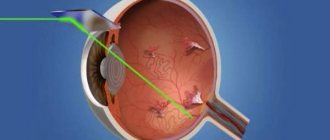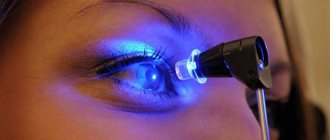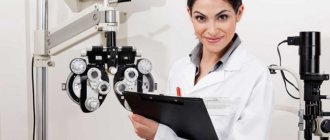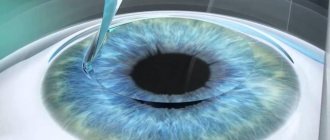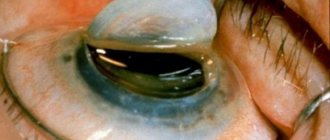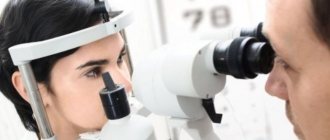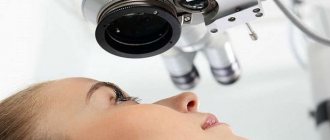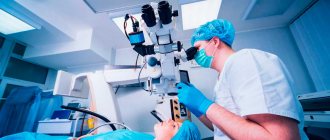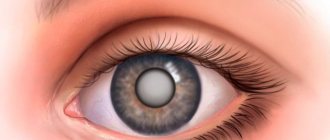Laser vision correction is a surgical intervention, after which it is necessary to undergo a rehabilitation period. Its duration depends on the chosen technique, the degree of qualification of the doctor, and the modernity of the equipment.
After the procedure, the doctor warns the patient about actions that are prohibited. Also gives recommendations on the use of medications and the time of re-administration for additional examination of the patient. This reduces the risk of complications after the procedure.
Recovery after surgery
It is recommended to remain in the clinic under the supervision of medical staff for several hours after the operation. Vision may be unstable at first, but then becomes increasingly clear and precise. That is why leaving a medical facility on your own, unaccompanied, is strictly prohibited. It is advisable to come to the procedure with one of your relatives or friends. Even before the start of surgery, be sure to notify the doctor about your planned trips, which will occur in the first weeks after surgery to restore vision.
There is no strict ban on flights, but it is still better to avoid using air transport at first. For several weeks, the eyes remain highly sensitive to bright light, but the clarity of vision is still insufficient.
After LASIK surgery
After completion of the operation, strict adherence to all doctor’s recommendations is necessary, including:
• timely instillation of drops;
• carrying out procedures prescribed by an ophthalmologist;
• regular medical examinations, according to the established schedule.
During the first few days after surgery, it is recommended to wash the skin around the eyes exclusively with boiled water, using a cotton swab, in the direction from the inner to the outer corner of the eye.
You are allowed to wash your hair no earlier than the third day after surgery. To avoid getting soapy water in your eyes, you should tilt your head back when washing your hair.
Swimming in open water or in a pool is not allowed for a month after correction, and visiting a sauna or bathhouse is also prohibited.
To avoid inadvertently damaging the cornea, you must be careful when walking and avoid picnics and active outdoor sports for a while.
For two weeks after surgery using a laser, you must follow a gentle regime for the eyes: reduce the total time reading, working on the computer and watching TV (the time spent on these activities should not exceed 2 hours in total). Further, returning to the usual way of life, the load on the eyes is gradually increased.
Colds are a particular danger immediately after surgery. For the first 2 weeks, you should avoid drafts or hypothermia, visiting crowded places (especially if there is a declared epidemic danger). Also, in the first few months after correction surgery, there is no need to plan long trips with climate change, which can adversely affect vision.
In the first six months after laser correction surgery, you should stop planning pregnancy.
For a year after surgery, you should not sunbathe and be sure to wear sunglasses in bright sunshine.
Useful article on this topic: laser correction surgery
Proper care
After Lasik surgery, the patient feels some discomfort. These are normal sensations, since laser correction involves influencing the structure of the visual apparatus. Typically, the following symptoms are observed:
- swelling of the eyelids;
- feeling that there is a foreign body in the eye;
- spots before the eyes;
- dilated pupils;
- lacrimation;
- itching;
- inflammation.
These unpleasant signs accompany the patient for 5-6 hours after the laser beam is applied to the eyes. If the symptoms cause severe inconvenience, you need to learn to cope with them correctly.
- To reduce the risk of discomfort, you need to consider the limitations after laser vision correction.
- To clean the eyes, use clean gauze soaked in warm water.
- Avoid touching the mucous membrane;
- Do not use special liquids that are sold in pharmacies, as they increase swelling, itching, and redness.
- The problem of severe dryness can be solved with the help of tear substitutes without preservatives (they should be prescribed by a doctor).
- If there is excessive tearing, use sterile wipes, do not rub your eyes, but gently blot the tears.
For 10 days, the patient must drip special moisturizing eye drops. In rare cases, if there is a risk of complications, the use of antibiotics is required. For a month you need to use a gel that moisturizes the eyes and accelerates regeneration processes.
Possible complications after laser correction
Complications after laser vision correction are minimized. The intervention is often not perceived as a major operation and in some countries is considered a cosmetic procedure. Modern laser equipment minimizes the human factor and allows you to pre-set personalized parameters for each operation. The absence of general anesthesia and the ease of the rehabilitation period determine the ease of acceptance of the manipulation by the patient and rapid recovery.
In most cases, the operation allows you to achieve all the parameters of visual acuity that were initially planned during preoperative consultations in the clinic. However, complications from microsurgical intervention cannot be completely excluded. No patient can be immune from unforeseen circumstances during or after correction.
The main complications of vision correction using laser beams:
- inflammatory changes;
- increased intraocular pressure;
- changes in the condition of the retina;
- violation of the integrity or configuration of the cornea;
- dry eye syndrome;
- swelling of intraocular structures;
- various visual impairments.
The main expected outcome of the operation is the achievement of high visual acuity and restoration of the functions of the visual system. Therefore, patients expect to feel positive changes immediately after the intervention. However, a number of external or internal factors can lead to unforeseen features - lack of effect or short-term results of manipulation.
The reasons for such consequences may be:
- Changing laser exposure parameters before surgery.
Laser devices are pre-set according to the patient’s individual indicators of initial visual acuity. Changing settings is a rare occurrence, but it is possible that a combination of several technical errors can result in the laser device not functioning properly. - Surgeons' mistakes.
Despite the fact that the influence of the human factor during laser correction is minimized, ophthalmologists carry out part of the intervention with their own hands, and also guide the device during the action of the laser beam. - Individual characteristics of the patient's body.
Additional risk factors, comorbidities, sensitivities, and other unforeseen internal circumstances may also lead to fluctuations in visual acuity. - Violations of recommendations and restrictions.
Patients themselves are often to blame for changes in visual acuity after laser correction.
It is considered a relatively normal situation if vision decreases after laser correction in the evening. Visual perception of objects in low light conditions is complex, and damage to the retina or other ocular structures can negatively affect twilight vision. Usually, after a month, all unpleasant symptoms disappear and night vision is restored.
Also, on the verge of relative contraindications, surgery is considered to be performed at the age of over 50 years, since the natural processes of age-related changes in visual acuity can negatively affect the results of laser correction. Carrying out LKZ does not change the natural processes of formation of farsightedness - presbyopia.
Wearing protective lenses
A mandatory step in proper correction is wearing lenses. They must take the correct shape, provide comfort and proper restoration to the eyes. The choice of lenses should be made by an ophthalmologist. The visual apparatus should not be subjected to heavy loads at once. Contact lenses are necessary to protect the epithelium from irritation and significantly reduce discomfort after laser correction. The first 6-20 hours of wear are accompanied by painful sensations, which soon disappear. You cannot remove lenses at home, as there is a high risk of damaging the delicate mucous membrane that has not yet recovered. For removal, it is recommended to contact a medical facility 3-4 days after the operation.
If there is intolerance to protective lenses, wearing them is accompanied by severe discomfort, they are removed earlier. To enhance the effect of the correction and improve the condition, the patient is recommended to get plenty of rest. For severe pain, you can take a painkiller, but only in the dosage prescribed by your doctor. If the lens falls out, do not try to put it back, contact a medical facility immediately.
Memo to the patient after performing the LASIK/Femto-LASIK laser vision correction procedure
The rules of behavior during the rehabilitation period after laser vision correction are not something unpleasant or difficult for the patient to follow. However, strict adherence to them and fulfillment of the doctor’s instructions is a guarantee of a speedy full recovery.
So, the patient must:
- Strictly follow the doctor's recommendations.
- Apply post-operative drops exactly as prescribed by your doctor.
- Always wash your hands before applying drops.
- Avoid eye injury.
- Wear sunglasses.
He is strictly prohibited from:
- Touch your eyes and eyelids on the first day after surgery.
- Overstrain your eyesight.
- Wash, shower or bathe in the first two days after surgery.
- Drink alcohol.
- Rub your eyes or press on your eyelids for the first month after the intervention.
- Wear clothes with a narrow neck over your head.
- Engage in active sports and lift weights.
- Visit the sauna, swimming pool, solarium for 3-4 weeks.
- Use eye makeup and hairspray.
- Until the end of treatment, swim in open water or a pool.
When the recovery period (up to a month) is completely completed, all restrictions will lose their relevance and will be lifted. After this, the person can return to their normal lifestyle and usual physical activity.
Eye protection after correction
In the postoperative period, it is important to observe certain restrictions, treat your visual apparatus with care, and not overload it. Remember that your eyes are exposed to street dust, bright light, and ultraviolet radiation, so they need protection. Wear sunglasses when you go outside. They are great for reducing light sensitivity and irritation. If the operation was performed in spring or summer, when the sun shines brightly, use glasses with an increased degree of protection against ultrasonic radiation.
Special glasses with side inserts provide reliable protection against the penetration of dust and foreign particles into the eyes in the wind or in very dusty rooms. Another important recommendation: avoid visiting establishments where people actively smoke, as acrid cigarette smoke negatively affects the condition of the eyes after correction. Protect your visual system from injury and avoid playing with children and animals.
Permissible loads
A reasonable dosage of load on the visual apparatus is an important condition for successful recovery in the postoperative period. Here is a list of restrictions that must be observed:
- do not overstrain your eyes by reading;
- don't squint;
- do not touch the visual apparatus with your hands, do not put pressure on it;
- limit time spent in front of the TV screen;
- Reduce work with displays (smartphone, computer, tablet, etc.) to a minimum.
During the first 3 weeks, prolonged concentration of vision should be avoided, as this tires the eyes, which leads to various unpleasant consequences.
Exercises
The early postoperative period requires limiting physical activity and increasing stress on the eyes and the entire body as a whole. Unfortunately, it is not always possible to fulfill all the specialist’s plans, since many patients are working and cannot provide themselves with an ideal postoperative regimen. For this case, special eye exercises have been developed to relieve stress on the muscular system and reduce the risk of complications.
The basic rule for performing gymnastic exercises in the recovery period is the regularity and frequency of their use - the more often the exercises are performed, the better.
The highest quality and most productive, and most importantly simple, exercises performed in any conditions and place are:
- frequent blinking of the eyes for 15-20 seconds - this exercise allows you to maximally relax the muscle structure of the eye and relieve tension;
- rapid movements of the eyeballs up and down, left and right for 20 seconds will improve blood circulation in the visual vessels;
- changing focus - first look into the distance for a few seconds (for example, what is happening outside the window), and then focus on an object nearby. For optimal effect, you can focus your gaze on an outstretched finger or an object at hand (pen, pencil, etc.) This task will reduce eye strain, so it should be performed every 30-40 minutes during the working day;
- sitting with your eyes closed for a few minutes also has a positive relaxing effect.
You should not overstrain your eyes when completing tasks. If your eyes become tense after training, you should stop performing further exercises and let your eyes rest closed.
Gymnastics after laser correction will help you replenish your strength and also increase your body’s resistance to negative factors. To achieve the best effect, experts advise adhering to a healthy lifestyle and following the necessary treatment and rehabilitation procedures.
Nutrition rules
Recovery after correction does not imply following a strict diet, but there are still some restrictions:
- avoid constipation, give preference to healthy foods;
- stop drinking alcoholic beverages for 10-20 days after surgery;
- introduce protein foods, vegetables and fruits into your diet;
- drink enough water.
It is strictly forbidden to drink alcohol for the first 3 days. The toxic substances it contains blunt the effects of antibacterial agents. In a state of intoxication, the risk of injury to the eyes increases significantly. In addition, the load not only on the visual apparatus increases, but also on the body as a whole, since the patient also takes medications. Alcohol provokes discomfort associated with severe dry eyes.
Advantages of laser vision correction procedure
When a doctor advises a patient to use this technique, many people naturally ask whether laser vision correction is dangerous.
First of all, you should pay attention to its obvious advantages.
The main one is the ability to improve vision in any of the majority of pathologies. After such a procedure, the patient may no longer wear glasses or contact lenses, which makes life much easier.
The operation takes place without anesthesia in the usual sense. Before starting laser correction, the doctor puts special anesthetic drops in the patient’s eyes, which helps him not to feel anything during the process. The whole procedure does not take more than a minute.
In some cases, the patient will feel mild discomfort when the anesthetic drops wear off. To get rid of them, your doctor may prescribe certain medications.
Laser vision correction can be performed in several ways, so the recovery time after it varies. For example, after LASIK, the patient can return to normal life with good vision within 2-3 days. The first day must be spent in the hospital. For the first few days, you need to be careful not to engage in heavy physical activity. You can take a few days off, but laser correction will not require a long break from work.
If you are afraid and wondering whether laser vision correction is dangerous or not, then keep in mind that the entire process is controlled by a computer. Any of the methods chosen by the doctor eliminates inaccuracy in the work, because the strength of the laser and its depth are set by a special program.
Eye hygiene
During the first 7 days, it is strongly recommended to protect the visual apparatus from water. Follow these recommendations:
- in the shower, take a position with your back to the pressure;
- stand further from the shower than usual;
- avoid getting shampoo into your eyes;
- If the cosmetic does get on the mucous membrane, use special drops to rinse, but under no circumstances rub your eyes.
If water gets on the mucous membrane, it can trigger the development of an inflammatory process, which will affect the results. Water from swimming pools and reservoirs is also dangerous.
Can I do makeup?
The use of decorative cosmetics should be avoided. Restriction period: 2 days before the procedure and 30 days after the operation.
- Do not apply cosmetics to the area around the eyes.
- You can't dye your eyelashes.
- You need to wash your face carefully. Don't use soap. Replace it with delicate foams.
- Waterproof mascara can only be used a month after the operation.
- Shadows, creams, and makeup removers should also be put aside, as they contain components that irritate the mucous membranes.
- Makeup fixing products, hairsprays and other aerosol products have a negative effect on the visual apparatus.
If you cannot refuse to use cosmetics, apply them very carefully to avoid getting on the mucous membranes. Just in case, you should definitely have refreshing drops. If a cosmetic product gets into your eyes, it will relieve irritation and reduce discomfort.
Beauty VS health: makeup after vision correction
Laser vision correction is carried out in a “one-day” mode; hospitalization is not required. After the procedure, the patient will spend several hours in the clinic. The doctor will make sure that the operation was successful, the upper layers of the cornea are positioned correctly, and will send you home. It will take several weeks to several months for the tissue to heal completely. Ophthalmologists, of course, are not stylists, but they give their advice on makeup after laser vision correction. When can you resume beauty treatments and what products are best to use so that you don’t have to choose between beauty and eye health.
Cosmetics on the first day after laser correction
The first day is the most important in the rehabilitation period, when you need to be as careful as possible and protect your eyes from any damage. Not only tangible ones, for example, injuries, but also invisible ones - from microbes. Applying cosmetics to the eyes during this period is out of the question.
On the first day after laser vision correction, it is strictly forbidden to touch, rub, or wash your eyes. Otherwise, you can displace the corneal flap, which was cut and raised during surgery. For maximum recovery, ophthalmologists recommend not touching your eyes for at least three days. You will have to protect them from cosmetics even longer.
You should not touch your eyes for the first three days after surgery. And makeup can wait too.
Eye makeup: taboo for a month
Doctors do not recommend wearing makeup after laser vision correction to maintain eye health. If even the tiniest foreign body, microparticles of powder or eye shadow gets into the eye and sticks to the unhealed corneal layer, inflammation may begin.
Restrictions on makeup after surgery apply not only to decorative cosmetics, but also to skincare:
- face cream, foundation, makeup base (avoiding the eye area): two days
- powder, bronzer, dry highlighter: five days
- eye cream: two weeks
- mascara, eye shadow, eyeliner: month
If the patient cannot even imagine appearing in public without makeup, during rehabilitation it is worth thinking about a vacation and not planning any celebrations for this period. An alternative to mascara in the postoperative period can be a procedure for lamination or coloring of eyelashes, if done before surgery. The effect will last for several weeks, you are guaranteed an expressive and healthy look.
How to wash your face after laser vision correction?
On the first day after surgery, you should not wash your face at all. For three days after surgery, doctors do not recommend washing your hair or doing it very carefully so that the foam does not get into your eyes. For the first two weeks, it is better to wash your face with boiled water, then with regular water. After laser vision correction, you should not use cleansers for a month.
Recommendations for eye care after laser correction
- Regular cleaning of brushes and sponges with disinfectants. When you start wearing makeup again after laser treatment, be sure to avoid any bacteria that may be present on your brushes or makeup products.
- You should not use waterproof mascara. To wash it off, you will have to make more effort and rub your eyes, which can harm them.
- Eyelash extensions will need to be removed a week before surgery and not reapplied for a month or two after. False eyelashes can also be used after a month or two.
- Permanent eyelid makeup is recommended to be done 6 months after laser vision correction.
It is better to replace waterproof mascara with classic one. This will allow you to remove makeup without extra effort.
It is important to remember that all deadlines are approximate. When you can wear makeup after laser vision correction is up to your doctor to decide. In each case, the recovery process proceeds differently. The speed of tissue healing directly depends on the surgical technique, the individual characteristics of the patient, and the strict adherence to the doctor’s recommendations in the postoperative period. Therefore, it is important to undergo regular follow-up examinations - after 1, 3, 7, 14 days, a month. We can talk about full recovery when the doctor removes the last restrictive recommendations.
Exercise restrictions
Sports are contraindicated. During the entire recovery period, stress on the body should be minimized. As a rule, this is for 1 month, but everything is individual. You should consult an ophthalmologist on this issue. Pilates, fitness and yoga are not allowed. Dancing should also be postponed until the eyes have fully recovered. Restrictions are imposed on visiting the gym and jogging. You should also give up football, basketball, swimming, boxing and other sports that can lead to eye injury.
Bans on sports:
- 1 week – football, swimming, bathhouse, sauna, tennis;
- 2 weeks – running, strength training;
- 3 weeks – scuba diving.
During sports activities, the eyes should be protected from sweat. Before starting exercises, wear a special bandage. Pregnancy should be planned no earlier than after 6 months. The result of Lasik correction may suffer due to changes in the hormonal balance in a woman’s body, as well as during the upcoming labor.
Car driving
Restrictions are also imposed on driving a car. The patient must take into account that vision is still unstable, and driving in this condition can lead to an accident. It is better to refuse to drive a car until the attending physician lifts this restriction. Driving a car during the day is permitted when a person sees evenly and clearly at a distance of 20 meters, vision is stabilized, and the picture is not blurred. But in the evening you will be able to drive only 1-2 months after the correction.
Is it possible to do laser vision correction again?
A repeat operation is prescribed when the phenomena of farsightedness and myopia remain, and you should not assume that a repeat correction is carried out because the first one was unsuccessful. It happens that decreased vision after surgery is caused by concomitant pathology; in this case, it is necessary to find out why the visual impairment occurred, and only then decide on the advisability of repeated intervention.
How many times can you do LKZ?
Theoretically, the number of operations is not limited, but much depends on how thick the cornea is. Each person has a different corneal thickness, and a thin cornea is a contraindication to surgical intervention. It is for this reason that the operation is not performed with a high degree of myopia.
To plan surgical treatment, a type of diagnostic study is performed such as pachymetry - measuring the thickness of the cornea. It can be carried out in two ways - optical and ultrasonic. Normal values for corneal thickness are 0.55 mm in the central part of the eye and 0.7-0.9 in the halo area.
Leisure
An important contraindication after laser correction is sunlight. They must be avoided. Do not visit the solarium or sunbathe on the beach. To avoid retinal burns, wear glasses with maximum UV protection. When choosing, give preference to models with dark glasses and durable lenses.
You should not plan long trips during the week. The patient must ensure that he has the opportunity to visit the attending physician within the prescribed time limits, and also contact him immediately in the event of complications. If a person decides to travel to a country with a hot climate for work or leisure, he or she must take with him glasses that can block UV rays of the A and B spectrum.
You should not sunbathe for 30 days after correction. It is dangerous to be on the beach, as sand can get into your eyes. Skiing or snowboarding requires the use of special glasses that protect the visual apparatus from injuries in the mountains and when falling.
Possible complications
Laser correction is an effective way to restore poor vision, which will help to significantly improve the quality of life and give up the constant wearing of contact lenses or glasses. But the result will be expressive and lasting if you strictly adhere to the recommendations of the attending physician in the postoperative period.
The procedure itself is not accompanied by painful sensations, but minor discomfort occurs afterwards. Typical complications that may bother the patient during the rehabilitation period:
- slight clouding of the cornea;
- sensation of a foreign body on the mucous membrane;
- redness;
- development of the inflammatory process;
- itching and burning;
- photophobia;
- tearing off a corneal flap;
- superficial keratitis.
To achieve the most positive results from laser correction, consider contraindications and follow restrictions during the first days, months, weeks after surgery. Put aside computer work and an active lifestyle for a while, provide your visual system with proper care and protection from various external factors. If you follow all the doctor’s recommendations, you will be able to restore clear vision and get rid of glasses and contact lenses forever.
Additional restrictions after laser vision surgery
In addition to the key limitations during the recovery period after vision surgery, there are a number of additional, but very important contraindications.
- Sports and physical activity
So, the patient should significantly reduce physical activity, and also completely eliminate:
- run;
- exercises in the gym;
- game and contact sports;
- gymnastic exercises and exercises.
Most often, this ban is one of the last to be lifted upon full recovery after laser vision correction. A person should return to their usual activities gradually.
- Drinking alcoholic beverages
Due to the fact that alcohol can provoke inflammatory processes in the body and significantly slow down the healing of the visual organs after laser vision correction, ophthalmologists strictly do not recommend its use during the three-month rehabilitation period.
- Working at a computer, reading and using gadgets
The use of electronic devices that promote high visual concentration, as well as reading, should be completely avoided in the first days after the operation. In the future, the patient is allowed to do this in small quantities, gradually increasing the load on vision. Thus, contraindications are removed individually, depending on the condition of the patient’s eyes; it is recommended to start with 1-2 hours, increasing the limit by 10-15 minutes per day. It is recommended to reduce the brightness on the monitor and gadget screens.
- Driving a vehicle
During the rehabilitation period after laser vision surgery, you should start driving no earlier than after one week. It is very important to get used to new optical conditions; for this, the patient should travel on lightly congested roads or empty areas. Some drivers, after laser vision correction, begin to feel the dimensions of the car and the distance of objects in a new way. You should avoid driving in the dark for a month, since at dusk the visual organs are affected by halos, reflections, glare, and headlights.
- Age contraindications for surgery
Laser correction for vision restoration is considered accessible to patients aged 18 to 45 years. Experts explain such limitations by the fact that in children under 18 years of age the visual system continues to develop, the size of the eyeball and refractive indices change, so the operation will be completely ineffective. In adulthood, after 45 years, ophthalmologists warn a person that the procedure is not a guarantee against the appearance of presbyopia (age-related farsightedness).
Such age restrictions on carrying out procedures to improve vision are still conditional; in each specific case, the doctor makes a decision individually.
Alternative technique – implantation of phakic lenses
A more progressive method of restoring vision is the implantation of phakic lenses. The technique is used for astigmatism, myopia, farsightedness, and is suitable for patients for whom laser correction is contraindicated. Restrictions after installing the lenses are minimal. During the recovery period, you do not need to change your regimen or observe any restrictions.
The essence of the method is to implant special biocompatible lenses into the cornea, which can cause swelling. But this side effect usually goes away within 24 hours. The patient is prescribed antibiotics, so other restrictions may be related to taking these medications. Installing phakic lenses is a quick, effective, safe way to restore vision with minimal negative consequences for the body.

